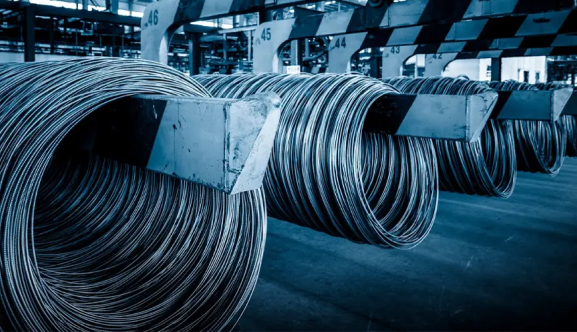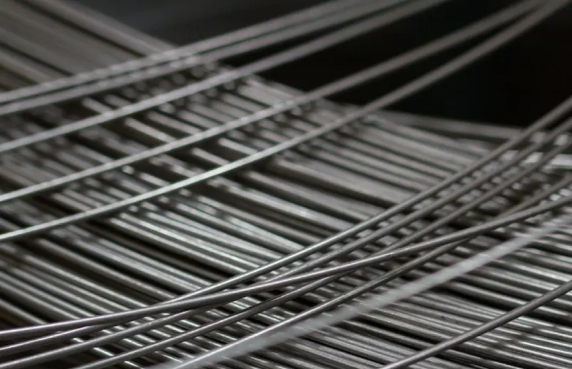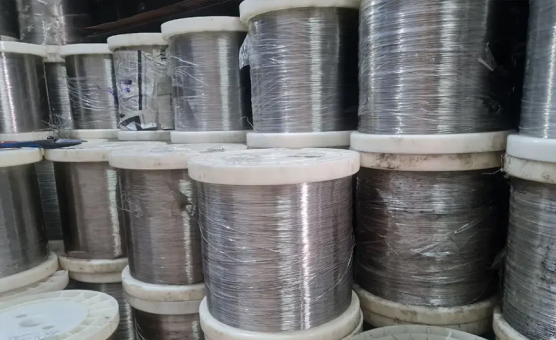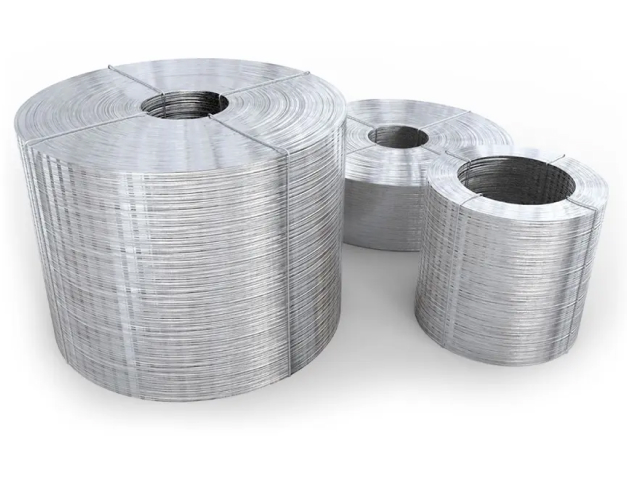
Wire alloys combine two or more metallic elements to create a new material with distinct properties. The goal is to enhance the characteristics of individual metals to make them more suitable for specific applications.
When you need a particular wire alloy for your project, trust Gerard Daniel to supply it. With 70 years of industry experience, our team can help you select the right alloy for your needs and make it to order.

Wire alloys are crucial for optimizing the performance, safety and lifespan of your application. Without the right electrical conductivity, mechanical strength, corrosion resistance or temperature stability, your wire’s performance will suffer. That’s why you should work with the wire experts at Gerard Daniel to ensure you get the ideal wire alloy for your project.
If you need help determining which wire alloy is right for you, please contact us for help.

Most of our wire alloys are cold-worked, which means the wire is shaped at room temperature or below without the use of heat.
Every time we put the wire through the die, the material undergoes cold working, which gives it more strength.
Other wire alloys are annealed, where the material is placed into a furnace to soften it.

The majority of our wire alloys are made to order to ensure they meet your specifications. We also stock a large inventory of wire so you can get exactly what you need when you need it. Contact us to ask about our stocking programs, just-in-time orders and blanket orders.
When you require a specific diameter for your wire alloy, we have you covered. In addition to standard diameters, Gerard Daniel can provide you with custom diameters for your project.

We offer a variety of stainless steel and nickel alloys for wire. If you don’t see a certain type of wire alloy listed here, get in touch with us to discuss your needs. Other alloys are available on request.

Stainless steel alloys are known for their durability, resistance to rust and corrosion, high tensile strength and versatility. These wire alloys are commonly used in electrical wiring, wire mesh, springs, cables and fasteners.
Stainless steel 302 has a higher carbon content ranging from 0.15-0.30%, which provides increased strength but can slightly reduce its corrosion resistance compared to lower carbon grades. It’s used in the production of springs, fasteners, wire forms and certain medical devices and surgical instruments.
Stainless steel 302HQ is a specialized alloy that contains 3.00-4.00% copper, which lowers the rate of cold work hardening. It also includes a higher carbon content than grade 302, promoting better machinability and minimal tool wear.
Stainless steel 304 is a widely used austenitic stainless steel alloy known for its excellent corrosion resistance, versatility and ease of fabrication. It’s among the most commonly used stainless steel grades worldwide. Stainless steel 304 has a high carbon content with a 0.08% maximum. It’s often used in food processing, dairy and dyeing industry applications because of its corrosion resistance to atmospheric corrosion, organic chemicals and inorganic chemicals.
Stainless steel 304L is a low-carbon variation of the popular stainless steel 304 grade. Its carbon content is limited to a maximum of 0.03% to reduce the risk of sensitization during welding. Stainless steel 304L is typically used in food processing, chemical processing, pharmaceuticals and dairy equipment.
Stainless steel 305 has higher nickel content (10.50-13.00%), making it more suitable for applications that require extensive forming or deep-drawing processes. It also has the lowest rate of strain hardening in its class. Stainless steel 305 is commonly used in cold-headed bolts and screws, and its non-magnetic properties make it suitable for electrical applications.
Stainless steel 310 is a high-temperature-resistant austenitic stainless steel alloy. It is designed to withstand elevated temperatures and has excellent resistance to oxidation and scaling at high temperatures. Stainless steel 310 is used for high-temperature industrial furnaces, chemical processing equipment, petrochemical industry applications and cement plant components.
Stainless steel 316 is a popular austenitic stainless steel alloy that offers excellent corrosion resistance, high strength and good formability. It’s often referred to as marine-grade stainless steel due to its superior resistance to corrosion in marine environments where exposure to saltwater and harsh conditions is common.
Stainless steel 316L is a low-carbon austenitic alloy with 0.03% maximum carbon. It’s proven to minimize sensitization during welding. Stainless steel 316L is ideal for applications requiring higher machining speeds and lower cycle times. This includes marine, chemical processing, pharmaceuticals, medical devices and architectural applications.
Stainless steel 317 is a high-alloy austenitic stainless steel grade that offers enhanced corrosion resistance. It’s specifically designed for use in highly corrosive environments, such as chemical processing, pulp and paper industries and marine applications.
Stainless steel 317L is a low-carbon, austenitic stainless steel grade. It offers excellent strength, formability and toughness, making it a reliable material for challenging applications that require resistance to corrosion and high temperatures.
Stainless steel 321 is an austenitic stainless steel alloy that is stabilized with titanium. It’s designed to provide improved resistance to intergranular corrosion and high-temperature environments. Stainless steel 321 can be used in various aircraft, automotive and chemical processing applications.
Stainless steel 330, also known as UNS N08330 or Alloy 330, is an austenitic stainless steel alloy that offers excellent high-temperature strength and resistance to oxidation and carburization. It can withstand extreme heat and thermal cycling conditions. Stainless steel 330 is typically used in aerospace, food processing, petrochemical, petroleum and high-temperature applications.
Stainless steel 347 is an austenitic stainless steel alloy that’s stabilized with columbium (niobium). The columbium content provides improved resistance to intergranular corrosion, particularly in high-temperature environments. It’s utilized for applications in the aircraft, automotive and chemical processing industries.
Stainless steel 410 is a martensitic stainless steel alloy that contains 11.5-13.5% chromium, which provides its corrosion resistance and hardening properties. It’s commonly used to produce cutlery and kitchen utensils, bolts, nuts, fasteners, pump and valve parts, shafts, gears and steam and gas turbine blades.
Stainless steel 416 contains higher sulfur content, which enhances its machinability but reduces its overall corrosion resistance compared to other stainless steel grades. One of its primary advantages is its excellent machinability, making it easier to cut, drill and machine compared to other stainless steels. It’s widely used in various machine parts and certain firearm components.
Stainless steel 430 contains 16.00-18.00% chromium, which provides its corrosion resistance, but it has lower nickel content compared to austenitic stainless steel. It’s often more affordable than other stainless steel grades, and it’s commonly used in kitchen appliances, automotive trim and molding and indoor architectural components.
Stainless steel 17-4PH is a martensitic precipitation-hardening stainless steel. It’s a versatile and widely used grade of stainless steel known for its high strength, excellent corrosion resistance and unique ability to be hardened through heat treatment. Stainless steel 17-4PH can be found in aerospace, petrochemical, marine and medical applications. Designers and engineers can heat treat stainless steel 17-4 to various strength levels while retaining corrosion resistance to meet specific application requirements.
Stainless steel 17-7PH is a semi-austenitic precipitation-hardening stainless steel. It achieves its high strength through a process of solution annealing followed by aging. Common applications for stainless steel 17-7PH include aerospace components, springs, diaphragms and other automotive components.
Nickel alloys provide outstanding corrosion resistance in a wide range of environments. However, they may not be suitable for use in sulfurous conditions. Nickel alloy wire is commonly employed in petrochemical and heat-treating applications.
Nickel 200 is a commercially pure nickel alloy known for its excellent resistance to various corrosive environments, particularly alkaline solutions and neutral or alkaline salts. It’s often used in chemical processing, food processing, aerospace, electronic, marine, power generation and heat exchanger applications.
Nickel 201 has a slightly lower carbon content, which makes it even more resistant to certain corrosive environments compared to Nickel 200. It’s a highly versatile material with superior corrosion resistance, especially in environments where carbon content must be minimized to avoid sensitization.
Nickel 205 contains a small amount of aluminum and titanium, providing better performance for electrical and electronic applications. It can be used for various electrical devices, terminals and mechanical supports.
Nickel alloy 400, also known as Monel 400, is a nickel-copper alloy that offers excellent corrosion resistance, high strength and good mechanical properties at a wide range of temperatures. It’s commonly used in marine and chemical environments because of its excellent corrosion resistance and high strength over a wide temperature range.
Nickel alloy 600 is a nickel-chromium alloy known for its excellent corrosion resistance and high-temperature strength. It offers a combination of mechanical properties and resistance to various corrosive environments. Nickel alloy 600 can be used in heat exchangers, chemical processing, power generation, aerospace, the nuclear industry, furnace components, the petrochemical industry and the pulp and paper industry.
Nickel alloy X-750 is a precipitation-hardenable nickel-chromium alloy that’s often used in high-temperature applications. This includes aerospace, gas turbine engines, nuclear reactors and industrial processing.
Nickel 800, also known as Incoloy 800, is a nickel-iron-chromium alloy known for its excellent resistance to high-temperature oxidation and carburization. It offers good strength and exceptional corrosion resistance in a variety of environments. Nickel 800 is typically used in furnace and electrical heating components.

Wire drawn and delivered to meet your timelines
We draw, grind, cut and package AS9100-certified stainless steel and nickel alloy wire for a wide variety of applications. With available inventory and the ability to meet a wide range of specifications, our lead times are typically 1-2 weeks.

Wire drawn and delivered to meet your timelines
We draw, grind, cut and package AS9100-certified stainless steel and nickel alloy wire for a wide variety of applications. With available inventory and the ability to meet a wide range of specifications, our lead times are typically 1-2 weeks.

Sunset Wire is a domestic wire manufacturer that draws, grinds, cuts and packages AS9100-certified stainless steel and nickel alloy wire for various applications.
© 2025 Sunset Wire. All Rights Reserved. Designed & Developed by Altitude Marketing.